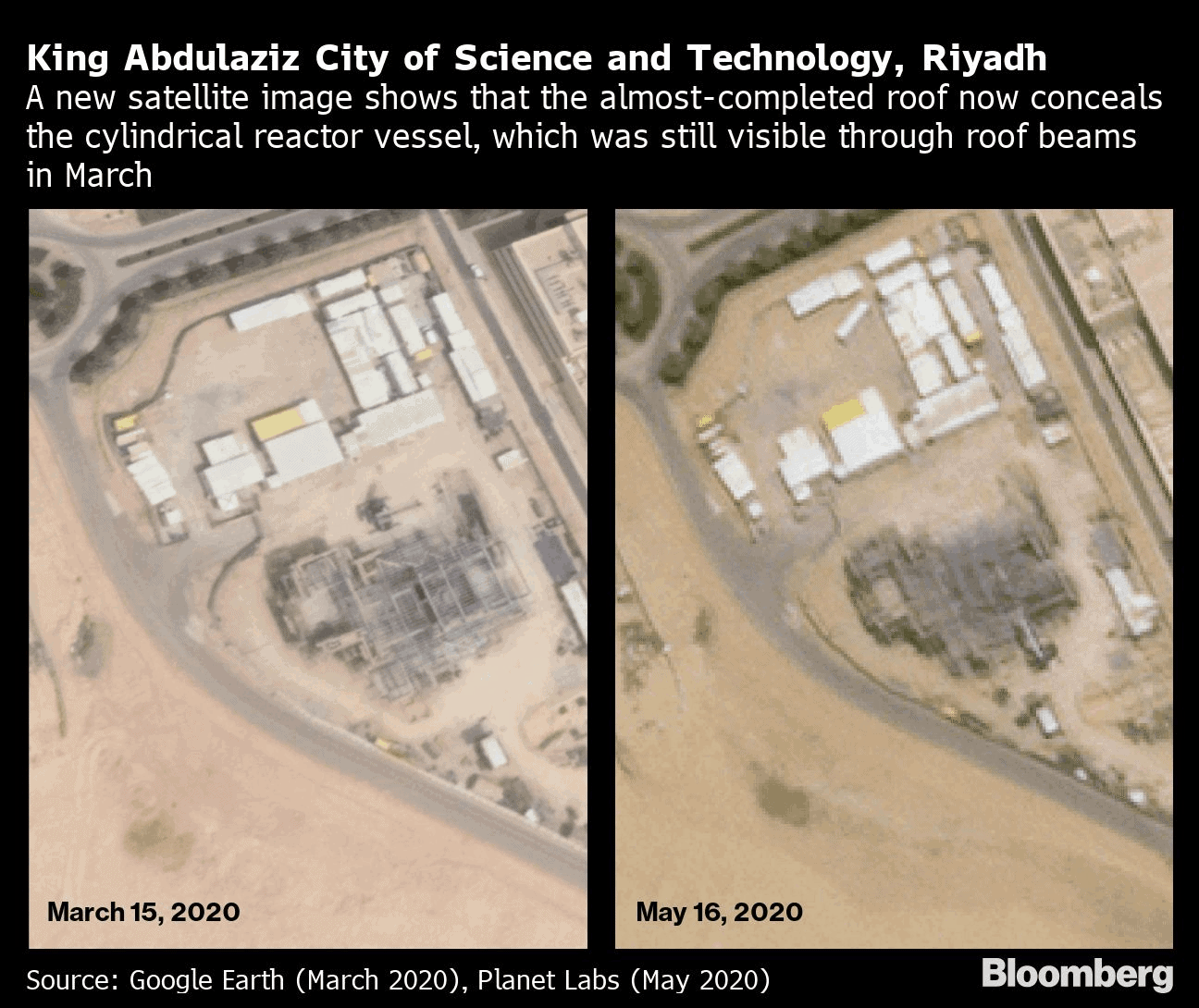Saudi Atomic Reactor Progresses With Inspectors Still Frozen Out

Saudi Arabia is pushing ahead to complete its first nuclear reactor, according to satellite images that have raised concern among arms-control experts because the kingdom has yet to implement international monitoring rules.
Satellite photos show the kingdom has built a roof over the facility before putting in place International Atomic Energy Agency regulations that allow inspectors early verification of the reactor’s design. Foregoing on-the-ground monitoring until after the research reactor is completed would be an unusual move normally discouraged under regulations to ensure civilian atomic programs aren’t used to make weapons.
Saudi Arabia has repeatedly pledged that its nuclear program is strictly for peaceful purposes, but Crown Prince Mohammed Bin Salman also said the kingdom would develop a bomb if its regional rival Iran did so. Those statements made in 2018 raised a red flag within the nuclear monitoring community which is uneasy that it has more ability to access nuclear sites in Iran than it does in Saudi Arabia.
Saudi Arabia’s ministry of energy didn’t respond to a request to comment.
While Saudi Arabia has been open about its ambitions to generate nuclear power, less is known about the kinds of monitoring the kingdom intends to put in place. President Donald Trump’s administration sent a letter to Saudi Arabia last year setting requirements to access U.S. atomic technology. The baseline for any agreement is tougher IAEA inspections.
“Saudi Arabia is aware of what their obligations are,” IAEA Director General Rafael Mariano Grossi said Feb. 5 in Washington after meeting with U.S. Secretary of State Mike Pompeo. Grossi dismissed Saudi suggestions that it would acquire nuclear weapons if Iran did.
The situation hasn’t changed since Grossi spoke, an IAEA spokesperson said by email, adding that other countries have completed the transition to stricter monitoring after scaling up nuclear programs.
IAEA inspectors who account for gram-levels of uranium worldwide verify the designs of facilities to ensure that nuclear material is contained within and can’t be smuggled out via trap doors or hidden tunnels, said Robert Kelley, a former IAEA director who led inspections in Iraq, Libya and South Africa.
“They’re going to have to work with the IAEA forever if they want to move toward nuclear power and this would be the time to establish that relationship,” Kelley, a nuclear engineer, said of Saudi Arabia.
Background on Saudi Arabia’s Nuclear Ambitions
Why oil rich Saudi Arabia is Turning to Nuclear Power: QuicktakeSaudi Arabia Pressed by Trump Envoy to Allow Nuclear InspectionsSaudi Nuclear Reactor First Images Show Work Near CompleteAs Saudis Go Nuclear, U.S. Seeks an Edge Over Great-Power Rivals
At issue is the weak and outdated set of IAEA safeguard rules, called the “Small Quantities Protocol,” or SQP, that Saudi Arabia continues to follow, according to Laura Rockwood, the IAEA’s former chief lawyer who drafted stricter inspection guidelines to which the vast majority of countries adhere.
“The problem is that design-information verification has to be carried out while it’s being constructed,” said Rockwood, who now directs the Open Nuclear Network in Vienna.
Satellite images show that a thick lattice of roof beams is now covering the 10-meter (33 feet) high steel reactor vessel. Argentina’s state-owned INVAP SE sold the low-powered research reactor to Saudi Arabia.
While Saudi Arabia adheres to the Nuclear Non-Proliferation Treaty, the bedrock agreement that regulates the spread of material needed to induce fission, it still has to implement monitoring rules in line with its nuclear program development.
“Saudi Arabia’s agreement right now is completely minimal, out of date, and unequal to the task of providing the kind of transparency that the IAEA and other member states need about Saudi Arabia’s nuclear program,” said Sharon Squassoni, a researcher and former diplomat on non-proliferation issues at George Washington University.
Photo: © Bloomberg King Abdulaziz City of Science and Technology, Riyadh











